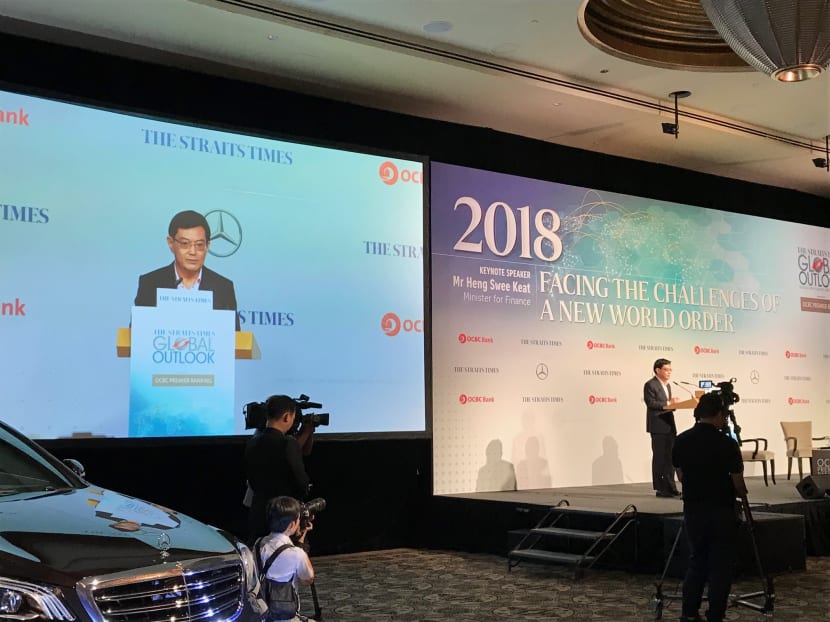Fiscal sustainability key to achieving country’s goals: Heng Swee Keat
SINGAPORE — Flagging the risks to traditional revenue sources brought on by technological disruptions and changing business models, Finance Minister Heng Swee Keat stressed on Tuesday (Dec 5) the need for Singapore to preserve fiscal sustainability in order to prepare for the future.

Minister for Finance Heng Swee Keat speaking at the Straits Times Global Outlook Forum on Tuesday (Dec 5). Photo: Angela Teng/TODAY
SINGAPORE – Flagging the risks to traditional revenue sources brought on by technological disruptions and changing business models, Finance Minister Heng Swee Keat stressed on Tuesday (Dec 5) the need for Singapore to preserve fiscal sustainability in order to prepare for the future.
This would entail "staying responsible and spending within our means", said Mr Heng.
"As expenditure increases and revenue growth slows, we must think of ways to manage expenditures and raise revenues. Fiscal sustainability is also about preparing for revenue risks in the face of technological changes and evolving business models," he added.
To ensure that the government can continue to balance the books, Singapore must remain pro-growth, and the system of taxes and transfers must continue to be fair and progressive. The country's revenue base has to be kept diversified as well, Mr Heng said.
In recent weeks, government leaders including Prime Minister Lee Hsien Loong have spoken about the need to raise taxes during future terms of government as Singapore's spending needs grow. Experts have said that increasing the Goods and Services Tax, which is relatively low compared with other countries and would not adversely affect Singapore's competitiveness, was the likely option.
Reiterating that the future will be unpredictable and fraught with complex changes, Mr Heng pointed out that Singapore's success in the years ahead depends on whether it has "the means to put our visions and values into action", among other factors.
To achieve its goals, which include making sure its citizens can not only make a "good living" but also better the lives of others, the Republic will have to develop an adaptable and innovative economy, nurture a caring and strong society, and build a secure and resilient country, he added.
Speaking at The Straits Times Global Outlook Forum, Mr Heng said these efforts are "all major investments for the long term… in our people, and in our future".
The Future Economy Council — chaired by Mr Heng and comprising members from government, industry, unions, and educational and training institutions — is spearheading efforts to transform the economy. "At the economy level, we are driving innovation, internationalisation and connectivity to keep our economy vibrant, open and connected to the world," Mr Heng said.
Enterprises and industries are also being strengthened through the Industry Transformation Maps, while the SkillsFuture initiative will enable Singaporeans to stay relevant and embrace lifelong learning.
Mr Heng said the government envisions a "caring, cohesive, strong society, where we respect and care for one another, where we each play a role, and we all move forward together". "I hope we nurture a society where our seniors are valued, respected, engaged and happy," he added.
Among other measures, the Government is enhancing retirement adequacy, improving healthcare access and affordability, and building strong social networks through efforts such as the Community Network for Seniors. It will also continue to help young Singaporeans own their first home and step up support for pre-schools.
"Whether we can do well will depend very much on how well we understand our own identity and values, how faithful we are to our values as changes put us under stress; and, how honestly and openly we as a people and a government converse with each other to figure out and act on the steps ahead together," Mr Heng said.
During a question and answer session, Mr Heng was asked by Bank of Singapore chief economist Richard Jerram about the possibility of spending a higher proportion of the earnings on Singapore's "huge assets".
Mr Heng replied that the size of the Republic's reserves gives Singapore "the firepower" to deal with anyone who tries to attack the Singapore dollar. It also provides long term stability to Singapore's economy, and give the country the means to "weather crisis in ways which many other countries cannot". The reserves are not to be taken for granted, Mr Heng stressed. If he can, he would rather leave it for the future generations, he said.
Reiterating the extent of Singapore's rapidly ageing population, Mr Heng said: "If we don't prepare for that, I think we will come to regret it and I want to make sure that… I will do the responsible thing."
Mr Heng noted how earlier generations of leaders and finance ministers were very prudent, even during the years when Singapore's gross domestic product was growing 8 to 9 per cent annually.
"They did not take it upon themselves and say, 'Well, look, this is a great bonanza and for a government to be popular let's spend all that'." He also credited former Deputy Prime Minister Goh Keng Swee for the creation of GIC. The sovereign wealth fund has, over the years, invested in a variety of assets and earned returns which Singapore has tapped on. "I will be very cautious about making statements about how big our reserves are… increasingly, in a world which is more uncertain, I think we better have more firepower than less," he said.






